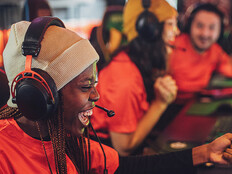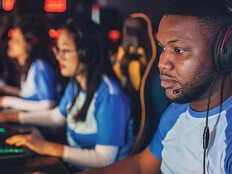Students Focus on Esports Team as a Top Priority
The Ottawa Braves practice every day. On a typical day, Beach attends class for four hours or more, then goes to his computer to practice Overwatch, the game in which his team competes on a national level. After another two hours of class, Beach works on producing livestreamed gaming content for another two or three hours. He may follow that with a late-night practice session, where his team will review gameplay.
Beach has helped his coach recruit more players for the team, reaching out to potential recruits through Twitter and Discord to ask them about their interest in collegiate esports and competing.
“There are already a lot of players looking for college opportunities. And there are a lot of bigger schools trying to snatch them up, offering full rides and stuff like that. We can’t really offer a full ride here yet, but we have a lot of other opportunities to offer to students,” Beach says. “We focus on getting them jobs in esports after they’re done with their four years of college, or getting them ready to livestream or upload to YouTube as a job when they’re done. We have a lot of connections that will help prepare them for that. Other schools may offer you that set scholarship. But they won't focus on anything else but the game. We capitalize on our connections and what we can do for the students here.”
MORE FROM EDTECH: Discover how CPUs are an important consideration for building an esports arena.
Campus Facilities Prove a Draw for Esports Recruits
Where other campuses may have a room set aside for esports with a dozen computers, Ottawa University provides its esports team with a fully outfitted arena in its Larry D. Peters Auditorium. The university outfitted the stadium with a state-of-the-art video production system and broadcasting capabilities, in addition to stocking it with computer power through a build-out with Horizon AVL and CDW.
Beach sums up his pitch to other students: “Hey, come to Ottawa University. We have a huge esports arena.”
“It’s an eye-catcher for a lot of people,” he says. “Other places set aside computers in a room. Here, we really take it seriously, and we even have streaming rooms for the players that are separate from this facility. The players can go and play on their own livestream to an audience and upload to YouTube from there,” he adds.
Beach is a top player at the collegiate level, and he’s planning to continue playing after college.
“Right after I finish college, I would like to be on an Overwatch team immediately. I want to compete as much as I can. So, yes, I plan on going pro after college,” he says.











